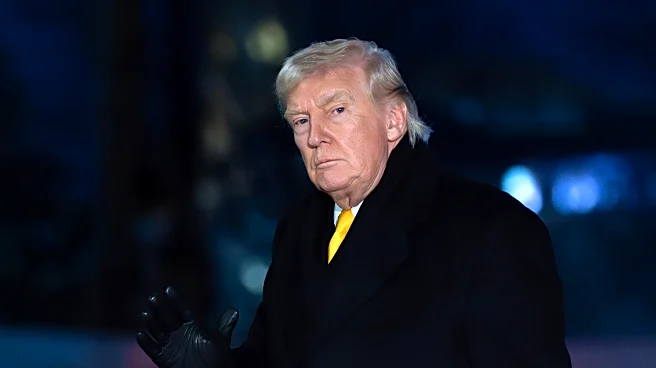What's Happening?
Lukoil's trading arm, Litasco, is facing significant operational challenges due to U.S. sanctions aimed at curtailing Russia's ability to finance its military activities in Ukraine. These sanctions have
effectively severed Litasco from the global financial system, leading to the dismissal of most of its traders and operational staff. The company is offering severance packages and bonuses to affected employees. Litasco's Swiss headquarters in Geneva is expected to shut down by the end of February, while its U.S. office in Houston has already seen most of its personnel depart. The sanctions have forced Litasco to rely on a shadow fleet of aging tankers to continue oil trading, as it struggles to maintain operations without access to necessary financial resources.
Why It's Important?
The dismantling of Litasco under U.S. sanctions highlights the broader geopolitical tensions and economic impacts stemming from Russia's actions in Ukraine. The sanctions are part of a strategic effort by the U.S. to weaken Russia's economic capabilities, particularly in the oil sector, which is crucial for funding its military operations. This development underscores the challenges faced by Russian companies in maintaining global trade operations amidst increasing international isolation. The situation also reflects the shifting dynamics in global oil trading, as Russia is forced to reroute its exports to Asia and rely on less conventional methods to sustain its oil trade.
What's Next?
As Litasco winds down its operations, the future of Russian oil trading remains uncertain. The reliance on a shadow fleet and alternative trading methods may continue, but these are fraught with logistical and financial challenges. The closure of Litasco's offices and the departure of its staff could lead to further disruptions in Russian oil exports. Additionally, the sanctions may prompt other Russian companies to seek new markets and trading partners, potentially altering global oil supply chains. The international community will likely continue to monitor the situation closely, assessing the effectiveness of sanctions and their impact on Russia's economy.
Beyond the Headlines
The sanctions against Lukoil and Litasco raise important questions about the ethical and legal implications of using economic measures to influence geopolitical outcomes. While sanctions are intended to pressure governments into changing their policies, they can also have unintended consequences for global markets and innocent employees caught in the crossfire. The reliance on a shadow fleet for oil trading poses environmental and safety risks, as older tankers may not meet modern standards. This situation highlights the complex interplay between international law, economic policy, and global trade practices.










